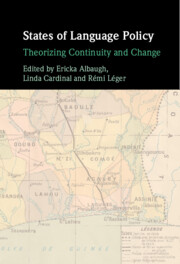Book contents
- States of Language Policy
- States of Language Policy
- Copyright page
- Contents
- Figures
- Tables
- Contributors
- Acknowledgments
- Introduction
- Part I Routes of Change
- Part II Dependent Relationships
- Part III Levels of Governance
- 11 Indigenous Reconciliation and the Limits of Canada’s Language Regime
- 12 State Tradition and Language Revitalization in Wales
- 13 Language Regime Change and Europeanization
- 14 Language Regimes, Global English, and National Public Education
- Conclusion
- Index
- References
14 - Language Regimes, Global English, and National Public Education
from Part III - Levels of Governance
Published online by Cambridge University Press: 14 November 2024
- States of Language Policy
- States of Language Policy
- Copyright page
- Contents
- Figures
- Tables
- Contributors
- Acknowledgments
- Introduction
- Part I Routes of Change
- Part II Dependent Relationships
- Part III Levels of Governance
- 11 Indigenous Reconciliation and the Limits of Canada’s Language Regime
- 12 State Tradition and Language Revitalization in Wales
- 13 Language Regime Change and Europeanization
- 14 Language Regimes, Global English, and National Public Education
- Conclusion
- Index
- References
Summary
Many academic and media accounts of the massive spread of English across the globe since the mid-twentieth century rely on simplistic notions of globalization mostly driven by technology and economic developments. Such approaches neglect the role of states across the globe in the increased usage of English and even declare individual choice as a key factor (e.g., De Swaan, 2001; Crystal, 2003; Van Parijs, 2011; Northrup, 2013). This chapter challenges these accounts by using and extending the state traditions and language regimes framework, STLR (Cardinal & Sonntag, 2015). Presenting empirical findings that 142 countries in the world mandate English language education as part of their national education systems, it is suggested there are important similarities with the standardization of national language at the nation-state level especially in the nineteenth century and early twentieth centuries. This work reveals severe limitations of other approaches in political science to global English, including linguistic justice. It is shown how in the case of global English the convergence of diverse language regimes must be distinguished from state traditions but cannot be separated from them. With the severe challenges to global liberal cosmopolitanism, the role of individual state language education policies will become increasingly important.
- Type
- Chapter
- Information
- States of Language PolicyTheorizing Continuity and Change, pp. 267 - 286Publisher: Cambridge University PressPrint publication year: 2024

